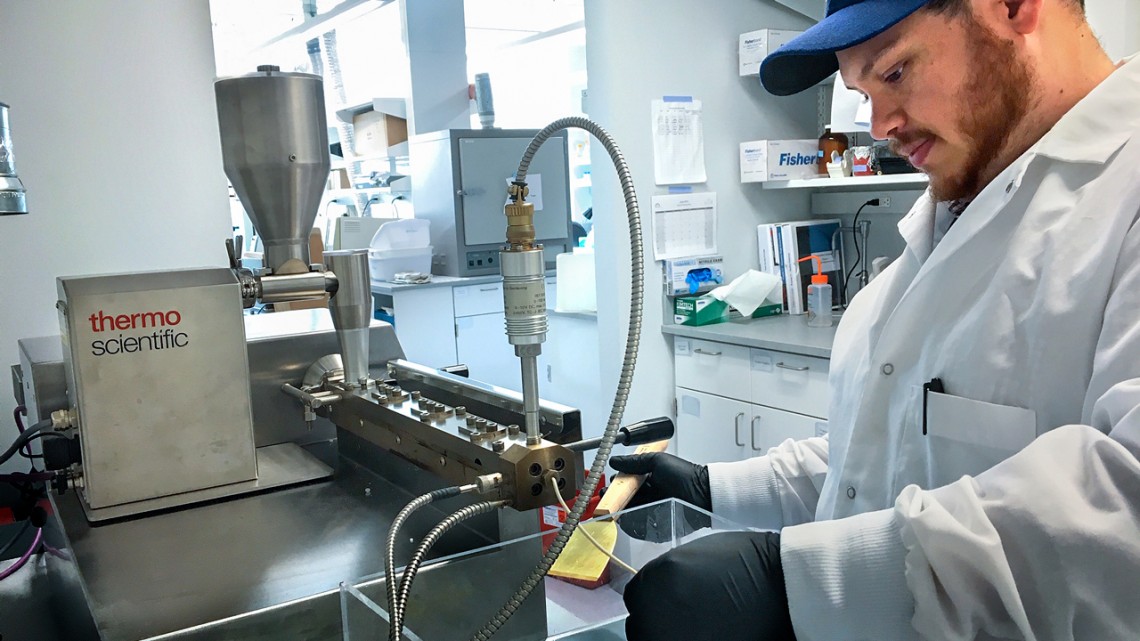
Graduate student Josh Herskovitz conducts research on active packaging in the laboratory of food science professor Julie Goddard.
USDA awards $1.8M to Cornell for packaging, beverage concentrate research
By Blaine Friedlander
The U.S. Department of Agriculture’s National Institute of Food and Agriculture has awarded $1.8 million to two Cornell food science research projects.
One project improves the commercial viability of a new food packaging material that actively reduces the need for preservatives, while decreasing food waste; the other project improves juice and beverage production to keep the fresh taste in concentrates.
Ever-increasing food waste represents an emerging threat to the economic and environmental sustainability of the U.S. food system, said Julie M. Goddard, associate professor of food science. Preservatives are added to foods to retain quality with a longer shelf life, but consumers are demanding a reduction in additives.
However, this consumer movement leads to unintended results: food that spoils more quickly, which could cause a surge in food waste.
“We’ve shown that you can introduce preservative functionality into packaging materials, so that we can reduce the additives in foods and beverages without losing product quality,” Goddard said. These “active packaging” materials are a promising new technology, but technological hurdles and consumer-mindsets have so far prevented their successful commercial translation, she added.
Removing the preservatives in food products – such as sauces, mayonnaise or salad dressing – would severely diminish shelf life, even with refrigeration. But by adding chelating agents – compounds that can sequester metal ions – to the jar or bottle itself, the food can last much longer without the additives seeping into the food.
“There is a lot of benefit in having fewer additives but gaining the preservative quality built-in to the package so they don’t migrate to the food,” she said.
During the research phase, the researchers will work directly with consumers and producers to ensure that the packaging material meets food-production, supply chain needs and that consumers are more likely to accept this new technology.
Joining Goddard on this project will be co-principal investigators Randy Worobo, professor of food science, and Motoko Mukai, assistant professor of food science; David Just, professor of applied economics at the Charles H. Dyson School of Applied Economics and Management; and Chris Ober, professor of materials science and engineering.
For the other project, Carmen Moraru and Olga Padilla-Zakour, both professors of food science, will lead research on using reverse and forward osmosis filtration and other cold processes to create nutritious, high-quality and tasty juices and beverages in an energy-efficient way. Collaborators include Miguel Gomez, associate professor of applied economics at Dyson, and Robin Dando, associate professor of food science.
Currently, juice processors use heat to create juice concentrate, but heat changes the product’s nutritional and sensory profiles.
“Our combination nonthermal process maintains product quality and makes the juice concentrate taste like it is fresh,” Moraru said.
Also, juice concentration consumes energy. “With this cold process technology, we can save energy and conduct the concentration at a fraction of the thermal evaporation cost,” she said.
The researchers will examine different filtration conditions for specific juices and other beverages. In addition to New York state fruit juices like apple and grape juice, the researchers will also examine concentration of cold-brew coffee and tea.
Juice and beverage concentrates make sense from a financial perspective, Moraru said.
“For commercial purposes,” she said, “it is more economical to transport concentrate rather than move the added weight of water. Concentrate is economical and stable, while water makes juices more prone to degradation.”
The developed processes will be transferred to industry stakeholders. Said Moraru: “Ultimately, this work will benefit consumers and will help boost the competitiveness and sustainability of the U.S. food sector by reducing the energy in food processing.”
These new projects add to the department’s growing research output in improving environmental sustainability in the U.S. and global food production by reducing food waste while improving energy efficiency.
Media Contact
Get Cornell news delivered right to your inbox.
Subscribe
